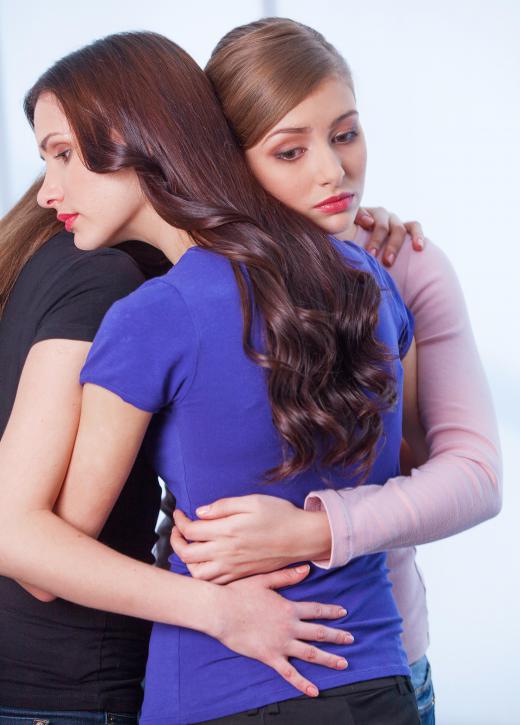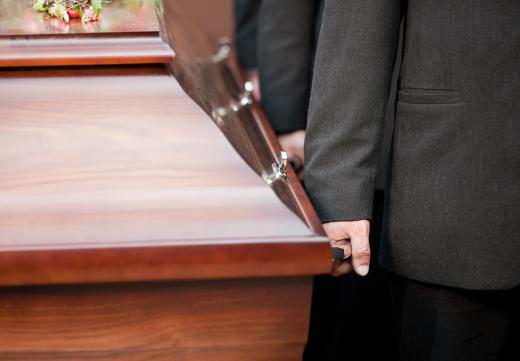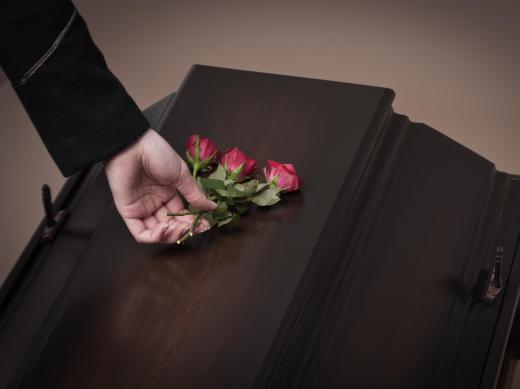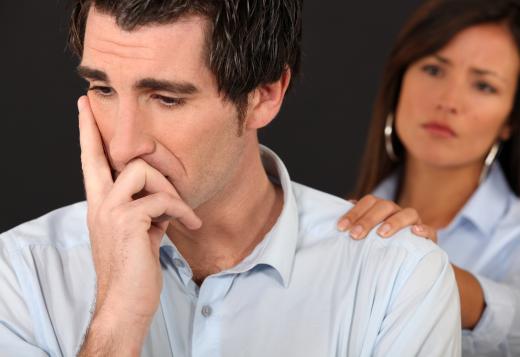At PublicPeople, we're committed to delivering accurate, trustworthy information. Our expert-authored content is rigorously fact-checked and sourced from credible authorities. Discover how we uphold the highest standards in providing you with reliable knowledge.
What is a Wake?
A wake is a gathering of people held as a way of coping with the death of a friend, acquaintance or relative. Depending on the culture in which it occurs, one can be very low-key and somber or happy and raucous. Typically, people hold one after a person has died but before the burial. It is not clear exactly where the term originates, although many theories based on different traditions and legends exist.
Timing

In most cases, people hold wakes within a week after a person dies, as regulations often require disposing of a body quickly. They usually take place prior to the funeral, however. In the United States, people sometimes schedule them for the same day as the funeral so that people can go directly to the cemetery afterward, but depending on the circumstances, holding one a day or two before the funeral is also common. The exceptions to this are when no body can be found, such as often happens with cases of missing persons, and when someone is cremated. In these instances, the event essentially doubles as the funeral.
Modern Purpose

The main reason for wakes in modern society is to give people a chance to come together and remember a person who has died. Through these events, loved ones can take comfort in each other as they mourn, and they recognize the larger influence that a single person had on the entire group. Those who attend usually pay their final respects to the deceased, and they often tell stories about his or her life. The process of going to one sometimes helps people accept the reality of the death.
Style

Wakes in the United States often are rather somber affairs, as they deal with the loss of human life. As with funerals, many people who go to one wear black or other dark colors. The style ultimately depends on the wishes of the deceased and his or her loved ones, however, as well as the beliefs they have. In some cases, for example, such as in the Irish tradition, people turn them into virtual parties despite their mourning, celebrating the dead person's life and the fact he or she has passed on to a better place. These types might feature prayer, upbeat music, eating and drinking, games and even dancing.
Traditions Around the World

In Ireland, when people want to hold a wake, they usually stop all clocks in the house, which some experts claim became tradition because doctors used to live far away — stopping the clock noted when the person died. It also showed that the mourners could grieve at their own pace. People also often cover the mirrors, following the superstition that if the dead person sees his reflection, his spirit will haunt survivors or get trapped in the mirror. The women of the family generally wash and dress the deceased, often in white, and perform keening, traditional mourning songs. As this takes place, based on the ancient Celts' belief that death is a time for rejoicing, guests celebrate the dead person, providing a balance for the grief.

Traditions similar to those found in Ireland, complete with feasting and drinking, exist in Jamaica and among the Maori of New Zealand, as well as in other cultures around the world. In the United States and Canada, these events are also known as viewings, because it is customary for people to look briefly at the body of the deceased individual as they say final goodbyes. Unlike in other areas of the globe, North American viewings usually happen in funeral homes rather than the home of the deceased.
Receptions

In some parts of the world, people who host wakes follow up with a reception, in part to thank guests for taking the time to attend and pay their respects. The meals served usually are lighter unless just a few guests come, and the foods tend to be ones that most people from the area like. Sometimes, the hosts make all the foods from scratch, especially if they want to honor the dead person by cooking his or her favorite dishes, but in other cases, the hosts invite all guests to have lunch or dinner at a public restaurant where they have reserved some space. Although this is more expensive, it is often more convenient, as the hosts frequently are very tired from making arrangements and grieving.
Origins

Why people use the term "wake" is not exactly clear, but according to one urban legend, people used to drink alcohol out of lead cups. They would pass out, and others would think they were dead. Just to make sure the person truly had died, friends and family would sit with the body to make sure the person didn't come back to life. The idea general idea was to keep someone from being buried alive.

Some people say that these events got their name from the way that a boat or other vessel leaves a trail behind itself when moving on the water. To survivors, the dead person is like the boat, moving on to the afterlife. Friends and family are left behind in the wake.
Another reason people call this type of gathering a "wake" might be because it used to be fairly common for people to rob graves for items like rings and watches after a burial. In the 18th and 19th centuries, some scientists went even further and stole bodies for science, a practice that, despite its gruesomeness, greatly advanced the understanding of human anatomy. Additionally, hungry, wild animals sometimes would disturb the burial plots. Friends, family or hired individuals would guard the place where someone was buried for these reasons. In fact, the word "wake" is related to the Latin vigil, which means to keep watch.
Still another theory about the origins of the term is that, by getting together and causing a ruckus with merrymaking, the dead person could not truly sleep and go into the next world. These events, when done "party style," were more for the dead person's benefit, not for the survivors. The rowdier the guests got, the better the odds were of getting a loved one to stir.
Some experts believe that the lightheartedness of the party wake, in reversing the normal expectation of grief, is symbolic of the chaos the spirit has to pass through to get to the next life. This representation is confusing and keeps the spirit from coming back to the world. Such "reversing" is evident in the some African traditions, such as wearing clothes of the opposite gender and allowing women to take dominant roles that normally would not be acceptable.
AS FEATURED ON:
AS FEATURED ON:


















Discussion Comments
@anon143855: I think what is truly appropriate after a person's passing is a judgment call. Personally, I'd question the motives of anyone who used a two month old child's death as an occasion to meet in a bar. However, there may be more to the situation than you, I or anyone else realizes. This may be a specific way for that baby's family to cope with their loss, and I wouldn't tell them to stop based on my own opinions.
Wakes are primarily for the living, even if they are ostensibly celebrating the memory of the dead. The parents of that child will still have time to grieve and recover in private, but the benefits of holding a celebration of life with relatives and friends may help with the healing process.
Is it appropriate to have a wake as a celebration of life in a bar for a two month old baby?
Is a wake or viewing public if it is held at a funeral home?
Recently my husband died and his ex wife from hell showed up.
Her and her entourage were told several times that they were not welcome at any of the services. They were asked to leave and refused until several of the family blocked their way and told them under threat of pain to leave. Since it is a public place and I'm paying to rent the area for the night, doesn't that give me any rights?
You write that wakes served to ensure that the deceased was in fact dead. Where did you find this fact? I ask because I read on Wikipedia that this is an urban legend.
Okay this may seem very morbid but for my 15th birthday i am having a "Live-Wake". Do you have any suggested as to what I should be wearing, what others should be wearing, and what kind of food/drinks should be served, etc., etc.?
We have always simply called the post-funeral gathering a reception and any foods traditional to the family culturally or family favorites are appropriate.
People arriving at the site (whether a private home or public place) are greeted by family members of the deceased. The type of meal is dictated by the number of people being received, space and resources.
A buffet of lighter foods is obviously easier with a large crowd than a sit-down meal, in other words. Many families take the opportunity during the meal to share memories, stories and anecdotes related to the deceased, and prayers may also be offered if that is the family's persuasion. These are generally in a lighter, more personal vein than those related at a funeral or memorial service. Non-religiously, positive thoughts and thanks for having known the person are appropriate.
OK, you said a wake could also be a gathering of close families and friends after the funeral.. if we are the ones hosting it, what is the proper etiquette as far as what to do, what kind of food and etc? help! the funeral is tomorrow! thanks Varinta
Post your comments